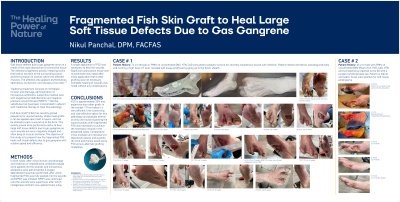Case Series/Study
(CS-114) Fragmented Fish Skin Graft to Treat Large Soft Tissue Defects Due to Gas Gangrene

Soft tissue defects due to gas gangrene arise as a result of the rapid destruction of connective tissue. The infection progresses quickly, releasing toxins that lead to necrosis of the surrounding tissue and the formation of cavities within the affected muscles. The affected area appears erythematous, edematous, ecchymotic with a foul odor. (1)
Traditional treatment consists of immediate incision and drainage, administration of intravenous antibiotics, supportive medical care with staged serial debridements and negative pressure wound therapy (NPWT). (2) Dermal substitutes too have been incorporated in adjunct with traditional therapy to treat this pathology.
Fish Skin Graft* (FSG) has recently gained popularity for wound healing. Unlike most grafts, it can be applied upon itself in layers, and can be utilized to pack a wound up to the brim. This quality proves to be particularly useful to heal large soft tissue defects due to gas gangrene as such wounds are very irregularly shaped and often deep to muscle and bone. The objective of this study is to present how the fragmented FSG heals soft tissue defects due to gas gangrene with relative speed and efficiency.
Methods:
In both cases, after initial incision and drainage and resection of infected bone, antibiotics beads were applied into the wounds and intravenous antibiotics were administered. A staged debridement was then performed, after which fragmented FSG was fully packed into the wounds and NPWT was initiated. NPWT was continued until the wounds were superficial, after which collagenase ointment was applied twice a day.
Results:
A single application of FSG was necessary to heal the wounds. Significant granulation tissue over muscle/bone was noted after initial application that further grafting was not necessary. Complete healing of wounds was noted without any complications.
Discussion:
FSG is approximately 33% less expensive than other grafts in the market. (3) This makes it a very efficient, time conserving and cost-effective option for this pathology (and possibly others) as only one application was necessary to achieve the necessary results in the presented cases. Comparative cross analyses are necessary to objectively assess and quantify the time and money saved using FSG versus alternate grafting modalities.

.jpeg)